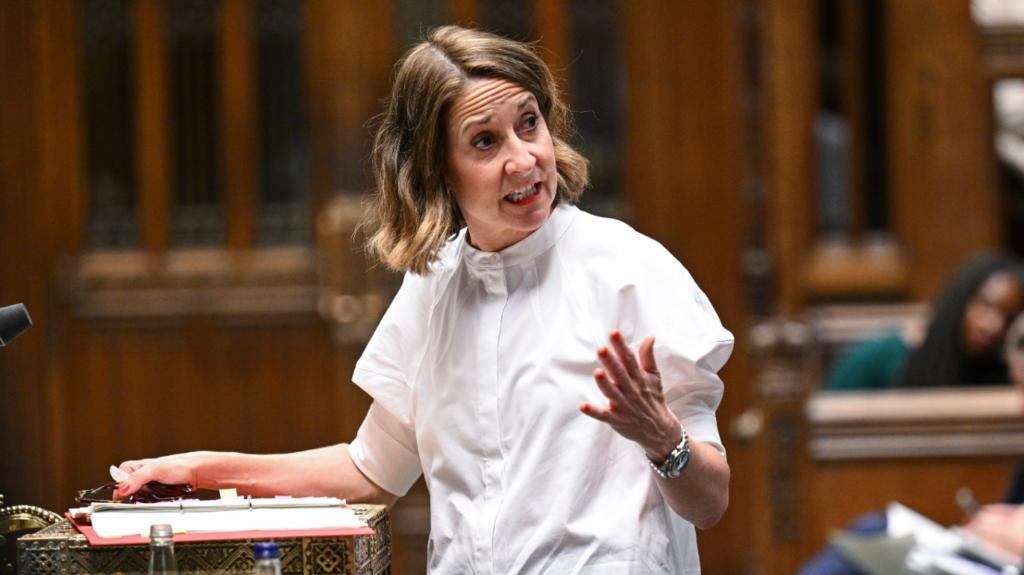Work and Pensions Secretary Liz Kendall has faced sustained scrutiny from Labour MPs regarding the implementation of changes to the benefit system, amidst government efforts to quell a potential backbench revolt.
Following a policy reversal last week, the government announced that stricter eligibility criteria for the Personal Independence Payment (PIP) would only apply to claimants applying after November 2026, rather than current recipients.
The government also pledged a review, conducted in partnership with disability organizations, of the assessment process, with findings expected by autumn 2026.
However, numerous Labour backbenchers have questioned the rationale for altering eligibility criteria prior to the completion of the aforementioned review.
Kendall stated that recommendations from the review, to be overseen by disability minister Sir Stephen Timms, would be implemented “as soon as possible” after its conclusion.
Furthermore, she emphasized that the Timms review would not be “driven by an objective of making savings,” adding, “It’s about making sure that this really vital benefit is fair and fit for the future.”
PIP assessments involve inquiries regarding activities such as preparing and consuming food, personal hygiene, and dressing. Each task is assigned a score ranging from zero, indicating no difficulty, to 12, representing the most severe limitations.
Under the government’s proposed system, new claimants would be required to score at least four points for a single activity to qualify for benefits, rather than qualifying based on support needs across a broader spectrum of tasks.
Debbie Abrahams, chair of the Work and Pensions Committee, asserted, “If this is being truly co-produced with disabled people in their organizations, the review should determine both the new process, the new points and the new descriptors, and we shouldn’t predetermine it at four points.”
Treasury Committee Chair Dame Meg Hillier requested that Kendall provide “the rationale for settling on those four points in one category prior to the Timms review.”
Another Labour MP, Sarah Owen, questioned, “What is the logic of making changes to future claimants before producing the Timms review?”
Following the parliamentary debate, Labour MP Connor Naismith stated that the Timms review would “not be implemented ahead of the cut off point for protection under the current system” and, consequently, he would be unable to support the government’s measures “without reassurance.”
The government’s shift in position followed threats from over 120 Labour MPs, including Dame Meg and Abrahams, to obstruct the Universal Credit and Personal Independence Payments Bill.
Ministers had hoped that concessions made the previous week would have reassured MPs, though approximately 50 Labour MPs are still anticipated to oppose the bill on Tuesday when the initial vote is scheduled to occur.
A coalition of 83 Labour backbenchers, in conjunction with other opposition parties, would be required to defeat the government.
Speaking in Parliament, Kendall stated that she had “listened carefully” and was “making positive changes as a result.”
She asserted that, as a result of amendments to the bill, no existing claimant would be forced into poverty.
She also defended the necessity of the bill, informing MPs that the government had inherited a system that was “failing on all fronts.”
“The welfare state must be fair, both for those who need support and for taxpayers, so it is sustainable for generations to come.”
The government initially projected that its plans would yield approximately £5 billion in savings by 2030 from the escalating welfare expenditure. During the statement, Kendall confirmed that the government’s concessions would amount to £2.5 billion by 2030.
Conservative shadow work and pensions secretary Helen Whately characterized the government’s actions as a “rushed and chaotic compromise” that would save £2.5 billion from a £100 billion budget.
She suggested that savings could be achieved by increasing the proportion of face-to-face assessments and addressing the “rising claims for common mental health problems such as anxiety and depression.”
Tory leader Kemi Badenoch later confirmed that her party would be voting against the bill, arguing that it did not offer “serious welfare reform.”
Liberal Democrat spokesman Steve Darling acknowledged that the cost of the benefit system was “skyrocketing” but added, “Balancing the books on the backs of the poor is wrong-headed in the extreme.”
Several MPs voiced concerns that the government’s restriction of eligibility for new claimants would create a “two-tier” system.
Kendall defended the measure, asserting that the benefits system “often protects existing claimants from new rates or new rules, because lives have been built around that support, and it’s often very hard for people to adjust.”
Earlier in the day, the government released new modeling estimating that approximately 150,000 people would be pushed into poverty by 2030 as a result of the welfare cuts—lower than the 250,000 projected prior to the government’s policy reversal.
A Downing Street spokesman stated that the modeling “doesn’t reflect the full picture” and was “subject to uncertainty.”
“What it doesn’t reflect is the wider action we’re taking to lift people out of poverty and raise living standards, especially through work,” he added.
Ministers hope to reassure wavering MPs after a rebellion over benefits cuts led to a major climbdown.
MPs including senior Labour figures sign an amendment that could sink the welfare reform bill.
The work and pensions secretary defends cuts that have angered more than 100 Labour backbenchers.
A bill to enact cuts – part of a package aimed at saving £5bn by 2030 – arrives in Parliament on Wednesday.
Liz Kendall tries to ease the impact of planned benefits cuts as Labour MPs consider rebelling.

